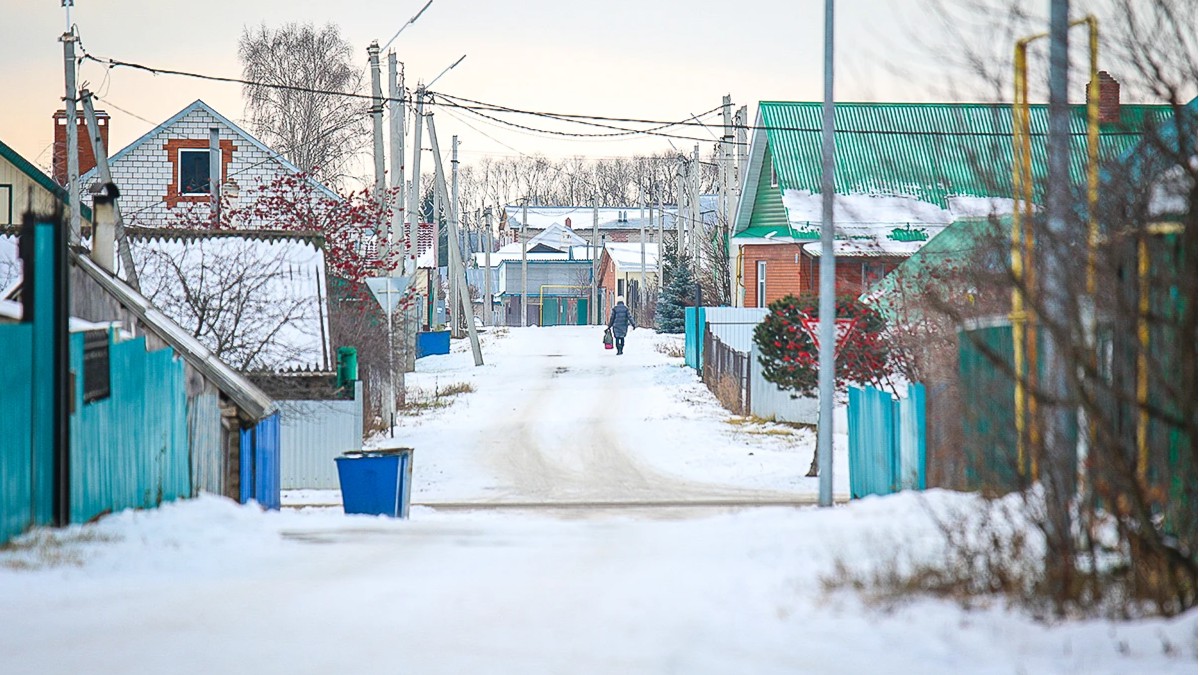Here what’s in store for you this week:
- We explain why one of the most influential and richest autonomous regions in Russia is standing up to the Kremlin and resisting to acknowledge Putin as the country’s only President;
- We profile the leaders of the Wagner Group — Putin’s so-called shadow army;
- Plus, we cover the recent harsh sentencing of protesters who demanded to reconsider unfair border redrawing from the Stalin era.
Tatarstan vs. the Kremlin
In August 1990, then-President Boris Yeltsin famously told Russia's constituent republics to "take as much sovereignty as you can stomach." Three decades later, nowhere does this phrase continue to resound as strongly as it does in oil-rich Tatarstan. This is the only national republic in Russia that has clung to the formal signs of sovereignty despite Putin's obsession with centralization. Calling the republic's leader 'President' is one such sign, and it has proven a thorn in the Kremlin's side. Our special correspondent Ilya Azar visited Tatarstan to figure out how much of its sovereignty remains and to what extent the republic would fight the Kremlin for its rights.
THE HISTORY. Less than a month after Yeltsin's declaration, Tatarstan adopted a declaration of state sovereignty. On March 22, 1992, there was an independence referendum in which 61.4% of voters (with a turnout of 81.7%) supported the republic's sovereignty. On November 30, 1992, a new Constitution of Tatarstan was adopted, which declared the republic a sovereign state. The idea was not to secede from Russia but become a union republic.
A FINE LINE. Tatarstan's authorities have been treading a fine line between appeasing the federal center and defying it. In 2019 the indigenous and Muslim-majority region pushed back hard against the Kremlin's rollback of indigenous language rights. At the same time, in 2020, the republic voted in favor of Putin's power-grabbing controversial amendments to the Constitution. Likewise, Tatarstan voted for the abolition of their republic's Constitutional Court — another symbol of its sovereignty. However, this wasn't enough for the Kremlin. In late 2021, two local deputies from ruling United Russia — Andrei Klishas and Pavel Krasheninnikov — introduced a bill that would prevent regional heads from calling themselves 'President.' All 82 deputies of Tatarstan's local parliament voted against it.
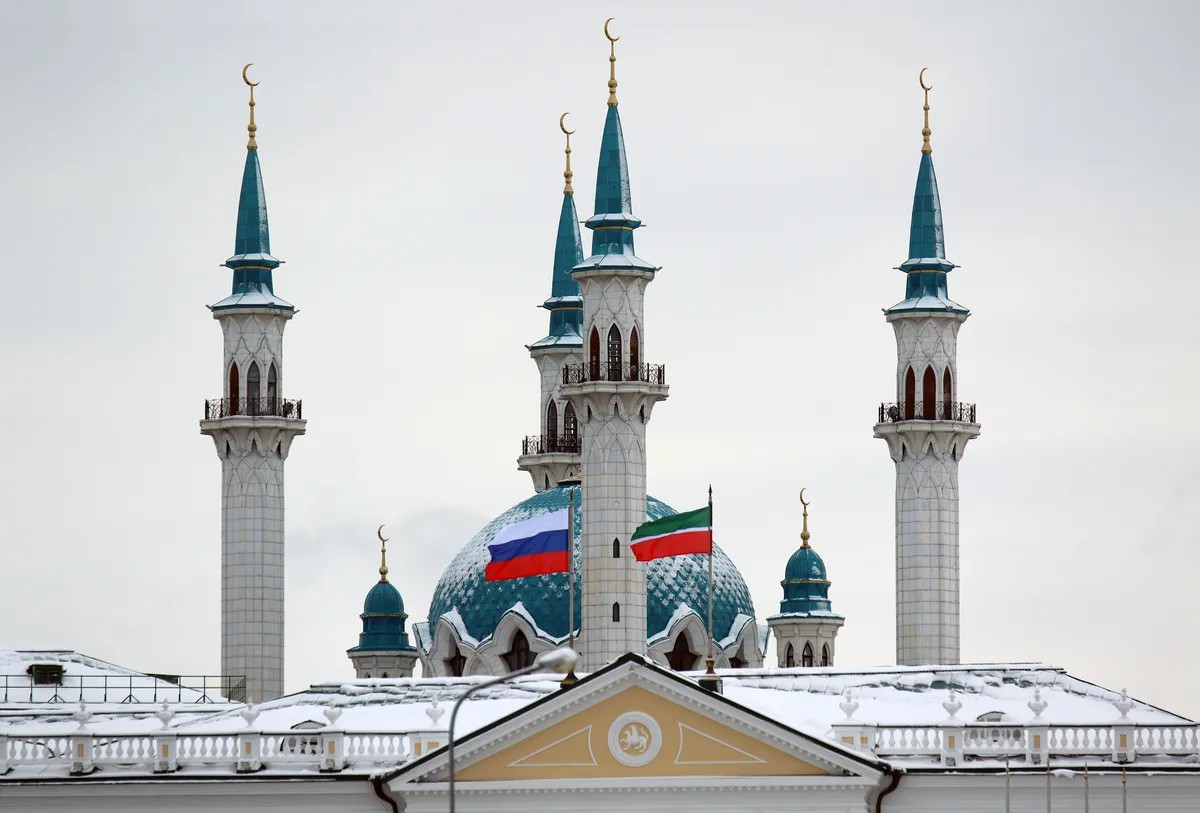
Photo: Anton Abramov
THIS IS THE KREMLIN'S SECOND ATTEMPT TO BRING THE REPUBLICS INTO FULL SUBMISSION. A similar bill, introduced in 2010, required all regional heads to give up the title of 'President' by 2015. 11 autonomous republics — including Chechnya — did so on time. Tatarstan did not, and the region's head, Rustam Minnikhaov, remains 'President' to this day.
THE CONFLICT HAS ROOTS IN RUSSIAN COLONIALISM. Since the early 2000s, President Putin has sought to undo the radical decentralization of the Yeltsin era to create a 'power vertical' in which Russia's federal regions fall into line with an all-powerful central government. Stripping regional heads of the 'President' title is part of this process. Tatarstan's defiance troubles the Kremlin because the specter of secession and State collapse looms large in the latter's imagination. The famous Tatar historian Damir Iskhakov believes that the historical roots of the Kremlin's campaign go further back than the 1990s to the Tsarist colonial era. "Russian society has a poor idea of Tatars," he says, arguing that Moscow still sees Tatars as inferior colonized people who should not pretend to have the same status as the imperial center.
RADIO SILENCE FROM TATAR PRESIDENT. Given that his title is being debated, one might think that President Rustam Minnikhanov would be in the center of the fray. This is not the case. Azar notes that Tatarstan's President has not made a public statement on the issue since the beginning of the last decade. Igor Veselev — businessman and former leader of the Tatarstan branch of the civil society group 'For Fair Elections' — explains the silence: "If he says that [the name is not important], then he will lose the support of the Tatar people, and if he says what the people want, he will come into conflict with the federal center [...] If you start active actions to preserve your status, connect society and media resources, then economic sanctions may follow, and maybe criminal cases."
PUBLIC RESPONSE. Azar spoke to Tatars from all walks of life about how they view the 'President' issue. We share some of the best quotes below:
Radif Kashapov (musician):
"It's not about what they call someone; it's about federalism and sovereignty. I was born in 1982, we call ourselves the 'generation of sovereignty' [...] Everything we do now is because we had a national education, we all graduated from Tatar schools, we are all bilingual. We have a clear national identity, and at the same time, we are not separatists."
Fanil Ilyasov (post office worker and United Russia deputy of the Sabinsky region):
"There are a lot of presidents! There is a president of a hockey federation or a football federation [...] We [Tatars] are used to it; we like that we have a president."
Ilgiz (a young Tatar man from Bogatye Saby):
"It makes no difference to me. He [Tatarstan's President] doesn't pay me anything [...] He's not for the people - they [the authorities] just get drunk there, they don't care about the people, they only think about their own pockets."
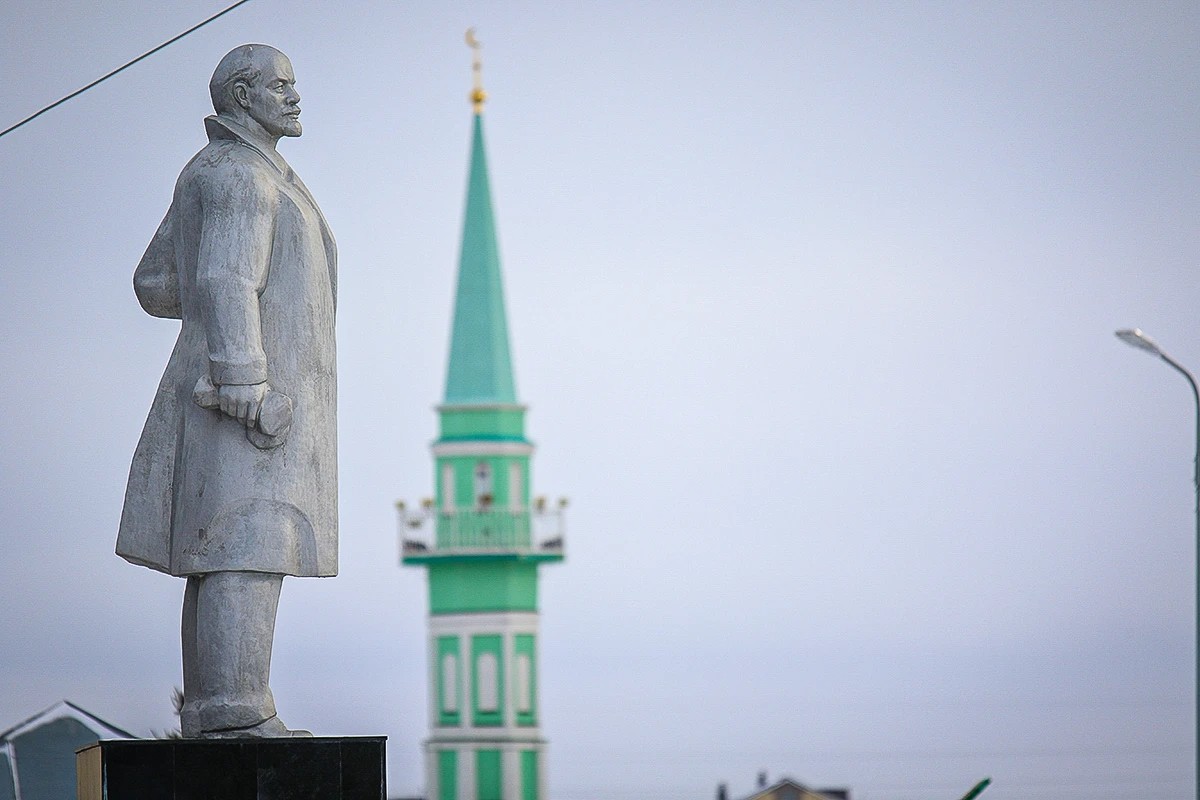
Photo: Anton Abramov
WHILE MASS PROTESTS ARE NOT ALIEN TO TATARSTAN, AZAR DOUBTS HOW FAR ITS POPULATION WILL GO TO DEFEND THE REMNANTS OF ITS SOVEREIGNTY. "At the moments when the fate of the republic is being decided," he writes, "people in Tatarstan do not take to the streets."
BACKSTORY. The Russian government's push for centralization dates back to 2004. At that time, Putin canceled direct elections for most provincial governors, while strong fiscal centralization made local self-governing elites directly economically dependent on the Kremlin. The authorities backpedaled slightly in 2011, resuming direct elections in the provinces through a party nomination process — which effectively put the candidate selection under the tight control of the ruling party. As a result, dissatisfaction with the lack of self-governing powers has been brewing in the regions for years. Russia has just 14 regions out of 85 regions where Russians are not the ethnic majority. With a population of approximately 3.8 million, Tatarstan has a reputation as one of the Russian regions that take federalism most seriously. Its President, Rustam Minnikhanov, has been in power since 2010. Critics accuse him of creating an "elected sultanate" and silencing all opposition. Tatars are the ethnic majority in their titular republic and constitute the second-largest ethnic group in Russia. Many of Russia's regions are rich in oil, gas, coal, and other resources, which Moscow uses to fill its pockets. Authorities often strip regional communities from valuable resources or treat them as storage facilities for environmentally harmful materials while failing to divide the profits fairly. Revenue often primarily feeds Moscow's budget, with regions only receiving scraps while bearing the brunt of the damage.
Read Azar’s full report here.
Wagner Group Sanctions, Explained
This week, The European Union imposed sanctions on the infamous Russian private military contractor Wagner Group and eight individuals and three other energy companies in Syria accused of helping finance the mercenaries in Ukraine, Libya, and Syria. The EU accuses them of conducting covert operations for the Kremlin, as well as of human rights abuses. The sanctions mean that the men named cannot enter the EU, do business with European companies, or receive loans from banks within the EU's borders. Our correspondent Denis Korotkov profiles the individuals concerned and explains which section of the sanctions list they fall.
ALEXANDER KUZNETSOV. Kuznetsov is the commander of the first Wagner assault squadron. The EU accuses him of "threatening peace, security, and stability" in Libya. Before 2008, he was a special force major from the Moscow region of Solnechnogorsk. In 2008 Kuznetsov was imprisoned for an unsuccessful robbery and kidnapping attempt. Released on parole in 2013, he joined Wagner in 2014, fighting in both Ukraine and Syria.
DMITRY UTKIN. Utkin is the reserve lieutenant colonel from whose code name — 'Wagner' — the PMC gets its name. He is the former commander of a separate detachment from the Pskov special forces brigade. According to the document, Utkin "was personally present on the battlefield in Ukraine, coordinated and planned the activities of the Wagner group members."
DENIS KHARITONOV. Kharitonov is a deputy of the Duma of the Astrakhan Region from United Russia, a functionary of the Union of Donbas Volunteers, a Wagner veteran, one of thirty-three "soldiers of fortune" detained by Lukashenko's special services near Minsk in July 2020. It is not clear why the EU included him on the sanctions list, although Korotkov speculates that it could be because Kharitonov is the only Wagner Group member to have built a public career.
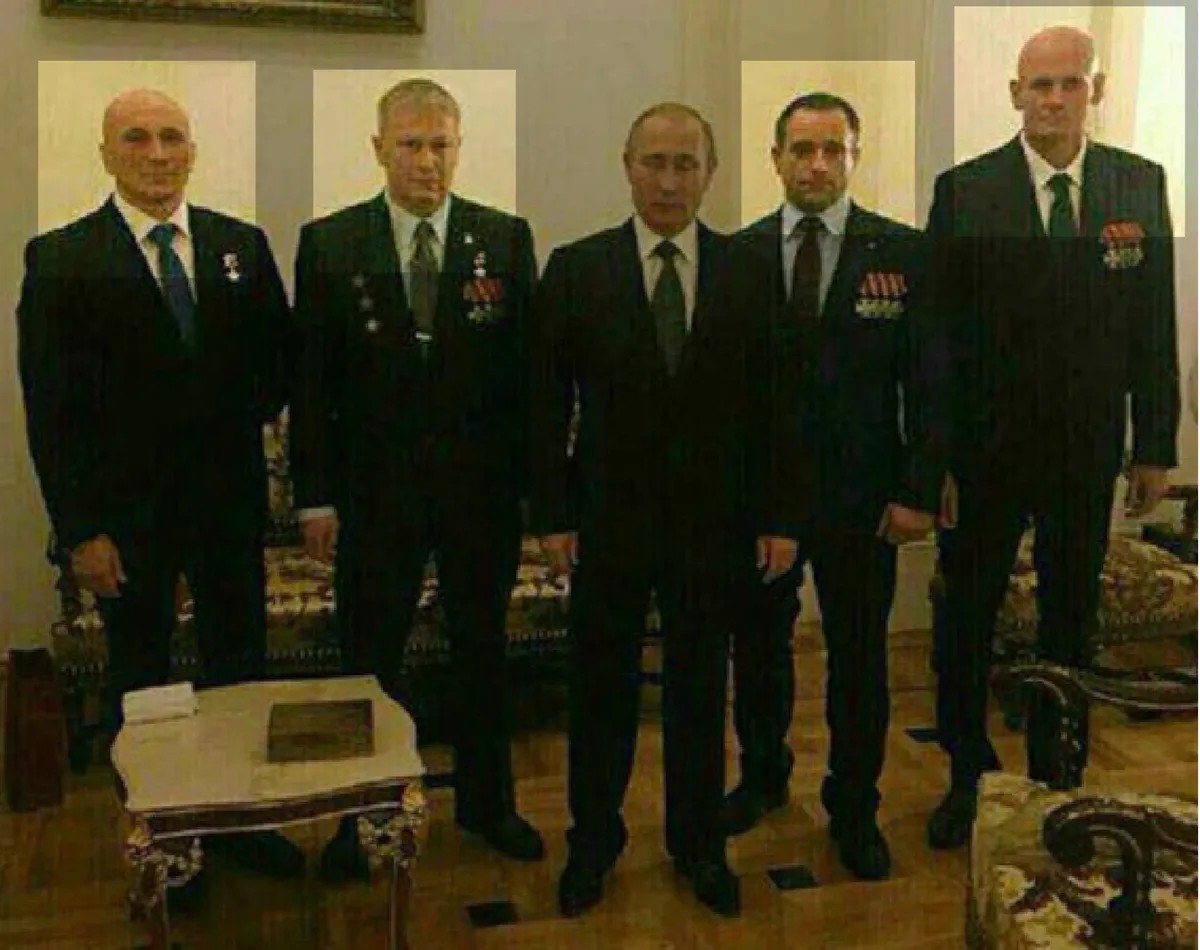
Famous photo from the Day of Heroes of the Fatherland in Kremlin. From left to right: Andrei Bogatov, Andrei Troshev, Vladimir Putin, Alexander Kuznetsov, Dmitry Utkin (Wagner). Four of them are already in the EU Sanctions lists.
SERGEI SHCHERBAKOV. Shcherbakov is neither a commander, nor a deputy, nor even a public figure. Judging by documents published by Ukrainian journalists, when Shcherbakov was recruited on behalf of the already defunct PMC "MAR" to "guard the Venezuelan oil fields," he claimed that he had personally shot down Ukrainian pilots in Donbas. The EU charged him with shooting two attack aircraft and one helicopter.
ANDREY TROSHEV. Troshev is a former paratrooper gunner who served in the St. Petersburg police special forces. He finished his service with the rank of police colonel. Despite his high rank, is not a very public figure and, perhaps, is no longer playing a leading role in the Wagner Group. The EU included him on the sanctions list for his actions in Syria.
ANDREY BOGATOV. Bogatov is a former paratrooper officer and peacekeeper in the former Yugoslavia. In 2014, he became the head of Wagner's fourth company. After losing an arm, he remained in the Group, commanding a company guarding an oil refinery in Syria.
STANISLAV DYCHKO AND VALERY ZAKHAROV. Little is known of Dychko. However, Valery Zakharov, a former employee of the Russian State Security Service (FSB), is the Security Advisor to the President of the Central African Republic (CAR). He is a key figure in the command structure of the Wagner Group. The EU accuses both of extrajudicial killings in Syria and CAR.
KREMLIN CONSIDERS THEM HEROES. One man's criminal is another man's hero. The Kremlin fetes their achievements while the EU condemns these men as murderers and human rights abusers. Troshev and Bogatov have been named "Heroes of the Russian Federation," among Russia's highest military honors. Kusnetsov and Utkin are all in an official photograph with President Putin to mark 'Defenders of the Fatherland's day.
BACKSTORY. Founded in 2013, the Wagner Group gained international notoriety through its shady dealings and human rights abuses on the African continent. The group has been linked to Kremlin-linked fixer Yevgeny Prigozhin, known as “Putin’s chef” due to his lucrative catering contracts with the Kremlin. Prigozhin has been doing the Kremlin's 'dirty work' everywhere from Africa, Syria, and Russian "troll factories." He is under US sanctions. Novaya Gazeta has faced attacks from Prigozhin for the better part of a decade. Apart from geopolitical flexing, Africa is a growing arms and natural resources market for Russia. Prigozhin is helping with the logistics of this expansion. Apart from the Central African Republic, the Kremlin is also heavily engaged with Sudan, Libya, Mozambique, and Madagascar. The details of the Kremlin's 'big return to Africa' are often classified or concealed from the public eye.
Read Korotkov’s full investigation here.
Ingushetia ‘Border Drama’ Sentences, Explained
It has been almost a century since the Soviet regime ruthlessly rewrote the borders of the conquered lands. But it still remains the source of friction and frustration for many inside Russia and beyond. On December 15, our reporter Lilit Sargsyan traveled to Essentuki - a city in Russia's southern Stavropol region - to attend the trial in which the defendants in the "Ingushetia border case" were sentenced. The story is a good illustration of how unresolved border conflicts still simmer within Russia and how it becomes more challenging for the Kremlin to pretend it is not an issue.
THE KREMLIN TRIED TO SQUASH PUBLIC UPROAR, BUT WITH LITTLE SUCCESS. The authorities chose Essentuki for the trial (a four-hour drive from Ingushetia, a small autonomous region in the Russian Caucasus), writes Sargsyan, to remove the case from the epicenter of border drama, and therefore prevent outbursts in public support of the accused. However, despite the distance, police and army agents had to prevent gathering crowds from entering the courtroom. One relative of each defendant was allowed inside. The judge delivered the sentences in less than 30 minutes.
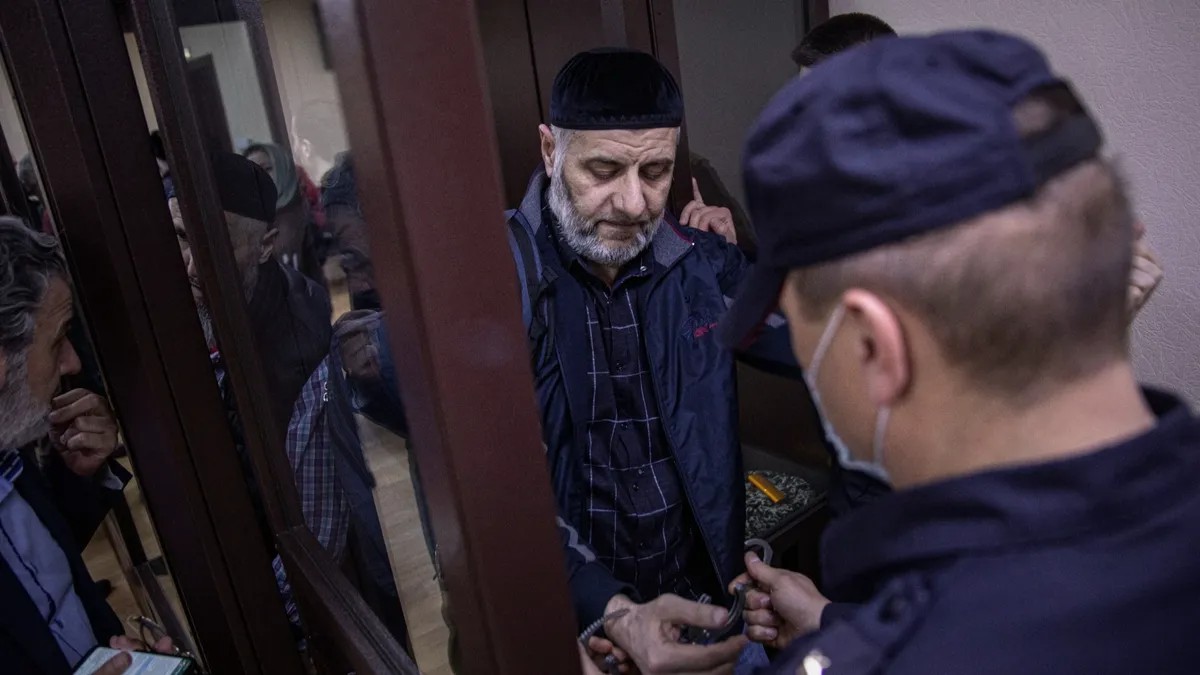
Barakh Chemurziev in the courtroom. Photo: Vlad Dokshin / "Novaya Gazeta"
WHO ARE THE DEFENDANTS? The trial featured 7 defendants. Malsag Uzhakhov (chairman of the liquidated Council of Teips of the Ingush people), Akhmed Barakhoyev (a member of the Council), Musa Malsagov (chairman of the Ingush Committee for National Unity), Barakh Chemurziev (Chairman of the businessmen association "Ingushetia's Support"), Bagaudin Khautiev (head of the Council of Youth Organizations of Ingushetia), Ismail Nalgiyev (head of the Ingushetia Choice organization), and Zarifa Sautiyeva (deputy director of the Memorial Complex to the Victims of Repression). Uzhakov and Barakhoyev are both in their late 60s, while Khautiev, Nalgiyev, and Sautiyeva represent the younger generation of Ingush civil society leaders.
THE REACTION. There was a fair sense of shock among relatives of the sentenced. Nevertheless, the mood outside the courthouse was defiant. Magomed Bekov, one of the defense lawyers, told reporters: "There is not a single proof of their [the defendants'] guilt. Even the evidence presented by the prosecution suggests that our clients are innocent." He also suggested the defense would take the case to the European Court of Human Rights. Khamzat Magomedovich Buzurtanov, deputy chairman of the Council of Teips of the Republic of Ingushetia, is equally steadfast: "People are unhappy with this injustice, this violation of their rights [...] this is a lie from the first to the last word. We will seek the release of our political prisoners. The truth is on our side."
WHAT ARE THEY ACCUSED OF? The prosecution accuses all the defendants of organizing violence against the security forces. They accused Malsagov, Barakhoyev, and Uzhakov of creating an extremist organization of which the other defendants were all allegedly a part. In fact, all of the accusations are linked to a recent wave of widespread unrest along the Chechen-Ingushetia border.
WHAT WERE THE SENTENCES? The prosecution got the exact sentences it requested: 9 years imprisonment for Uzhakhov, Barakhoev, Malsagov; 8 years for Chemurziev, Khautiev, Nalgiev; and 7 years and 6 months for Sautiyeva. Defenders and supporters think that the severity of the sentences is an attempt by the Kremlin to discourage the public from expressing their frustrations with the border issue.
BACKSTORY. In March 2019, thousands of Ingushetia residents took to the streets to protest against a border agreement with the neighboring Chechnya region. It was supposed to redraw the borders between the two and address some mutual grievances over how they were established during Soviet rule. However, the deal backfired and reignited long-simmering tensions. On October 30, 2018, the Constitutional Court of Ingushetia ruled that the agreement was illegal as changes to Ingushetia's territory required approval by referendum, but the Constitutional Court of Russia in Moscow overrode that decision later in the year. To tame the public unrest, the Kremlin forced Ingush head Yunus-bek Yevkurov out of the office and cracked down on the protest leaders and the region's civil society.
Read Sarkisyan's report here.
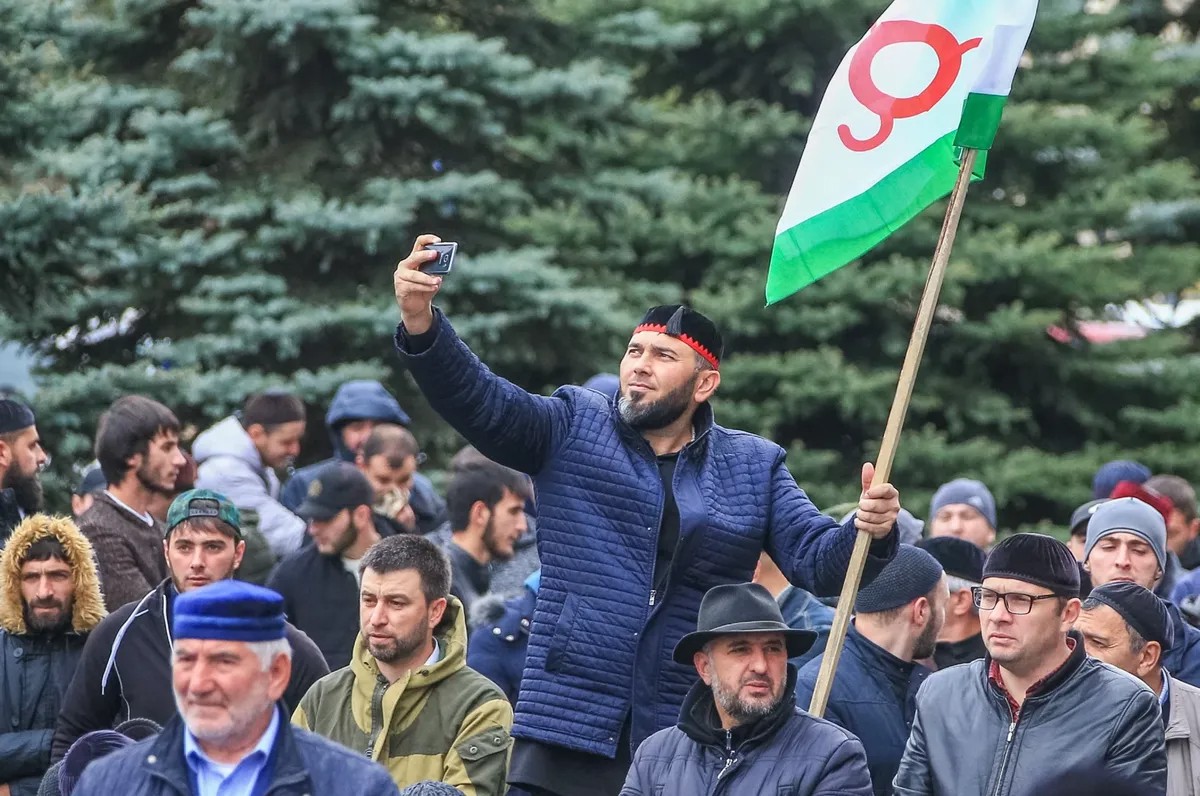
A rally in Magas. October 2018. Photo: Vladimir Smirnov / TASS
Bonus Round
- MOSCOW METRO SCANDAL. This week, our reporter Elizaveta Kirpanova visited Sakharovo — a district on the outskirts of Moscow — to report on the controversy surrounding new signage in the Proshkino metro station. A 20 minute bus ride away from the Multifunctional Migration Center — where all migrants must submit their documents in order to legally live and work in Russia - Proshkino is often filled with migrants from Central Asia making their way to and from the center. New signage featuring Tajik, Farsi, and Uzbek — in addition to Russian — has made the backs of both migrants and residents bristle. Migrants because many of them are already fluent in Russian — “We know Russian even better than they do”, said one angry taxi driver — and residents because of the usual refrain that incomers “should learn our language.” Authorities relocated the center to the Proshkino area in September. Unfortunately, as one might expect, the response of local residents to the increasing number of migrants in the area has been ‘not in my backyard’. One man interviewed by Kirpanova claimed that the greater number of migrants in the area had led to an increase in rape cases — a common racist trope weponized against migrants by ethnic Russians. This perception persists despite not being aligned with facts. A recent study that we conducted in partnership with ‘Important Stories’ showed that, in the last 4.5 years, Russian citizens have constituted 94% of criminals charged with sexual assault, while migrants from the CIS (Commonwealth of Independent States) account for just 5%.
